Car Accident Head Injury in Ontario, Canada
Car Accident Head Injury Settlements and Claims in Ontario, Canada
Car accident head injuries are a serious concern in Ontario, often resulting in life-altering consequences for those involved, often resulting in a range of physical and emotional injuries. One of the most serious outcomes of a car accident is a head injury, which can occur in various forms and degrees of severity. Head injury in car accidents can be caused by different factors, including the speed of impact, the size and weight of the vehicles involved, and the position of the occupants at the time of the crash.
Car crash head injury can have long-lasting effects on a person’s physical, cognitive, and emotional health. Recovery from a head injury in a car accident can be lengthy and challenging, requiring a multidisciplinary approach involving medical professionals, rehabilitation specialists, and mental health experts.
As an injury victim, you must know your rights following a car crash in Ontario. We will explore these rights, common head injuries and symptoms, offering guidance on protecting yourself and seeking appropriate compensation. Our discussion will also highlight proactive steps you can take to reduce the incidence of car accident head injuries, promoting a safer driving environment for all.
Let’s dig into it:
- What to Do If You Hit Your Head in a Car Accident in Ontario?
- How to Prevent Head Injury in Car Accidents in Ontario?
- What Are Common Head Injuries After a Car Accident in Ontario?
- Common Symptoms of a Head Injury from a Car Accident in Ontario?
- What Is the Average Payout for a Head Injury in Ontario?
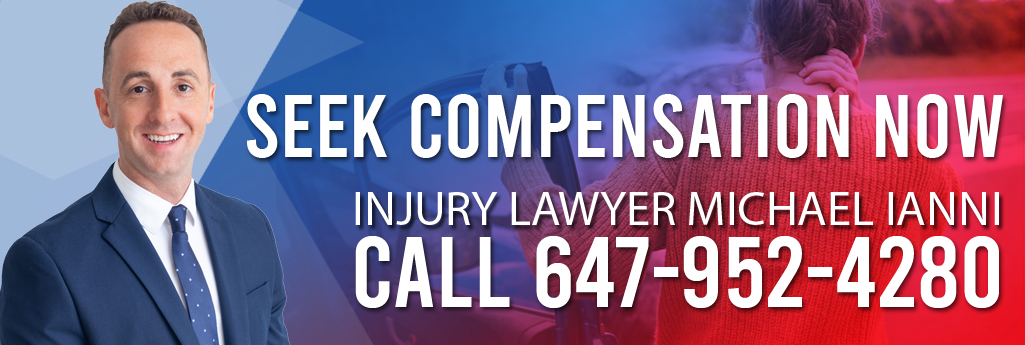
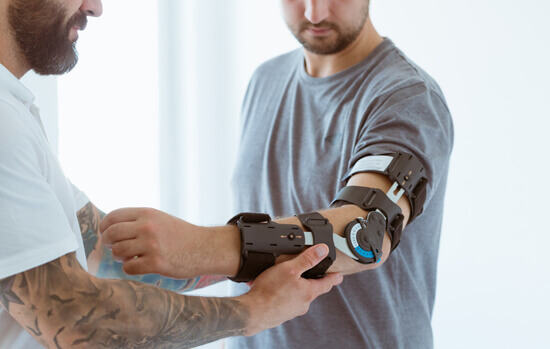
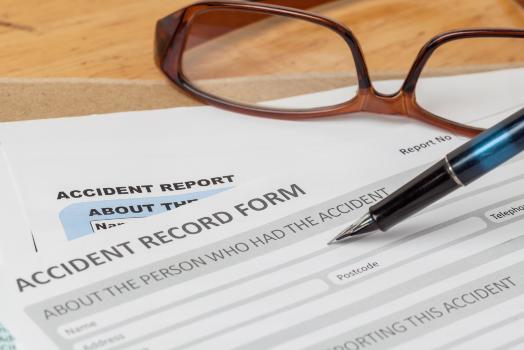
Car Accident Head Injury in Ontario, Canada
What to Do If You Hit Your Head in a Car Accident in Ontario, Canada
Experiencing a head injury in a car accident can be a frightening and overwhelming experience. Knowing the proper steps to take immediately after the incident can help improve your outcome and ensure you receive the appropriate care. Here’s what you should do if you hit your head in a car accident:
- Stay calm: It’s essential to remain as quiet as possible to assess the situation and take appropriate action.
- Check for injuries: Check out yourself and any passengers in the car for visible injuries, paying particular attention to head injuries. Look for signs such as bleeding, swelling, or bruising.
- Avoid moving if you suspect a severe injury: If you suspect a serious head or neck injury, it’s essential to avoid driving and wait for emergency medical personnel to arrive. They can immobilize your head and neck to prevent further damage.
- Document the accident: If you can, take photos of the accident scene, your vehicle, and any injuries you’ve sustained. Also, obtain contact information from witnesses and the other driver(s) involved in the accident.
- File a police report: Contact the local police department to file a statement about the accident, as this can be helpful for insurance and legal purposes.
- Keep track of medical treatment: Record all medical treatments and expenses related to the head injury, as this information may be important for insurance claims or legal action.
- Take it easy: Give yourself time to heal and recover physically and emotionally. Avoid strenuous activities, get plenty of rest, and gradually ease back into your daily routine as you start to feel better.
- Seek immediate medical attention: Even if you think the head injury is minor, it’s crucial to seek medical attention as soon as possible. Some head injuries may not show symptoms immediately, and prompt medical care can help prevent complications or identify issues that require further treatment.
- Follow your doctor’s recommendations: After receiving initial medical treatment, follow your doctor’s recommendations for follow-up care, medications, and therapy. This will help promote a smooth recovery and prevent complications.
- Negotiate with a personal injury attorney: If you’ve sustained a head injury in a car accident, it’s often beneficial to consult with a personal injury advocate who can help you navigate the legal and insurance processes and ensure you receive proper compensation for your injuries.
Remember, head injuries can have long-lasting effects, and seeking appropriate medical care and following through with recommended treatments is essential for a successful recovery.
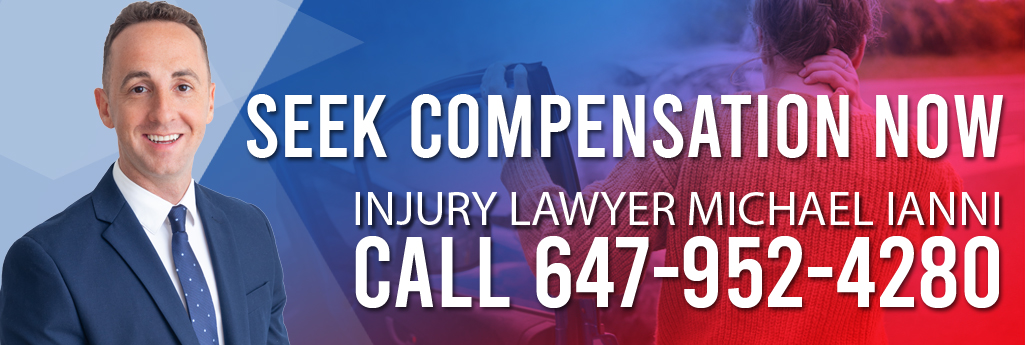


Head Injury In a car Accident in Ontario, Canada
How to Prevent Head Injury in Car Accidents in Ontario, Canada
Car disasters can happen to anyone, anytime, and anywhere, and the injuries resulting from these accidents can be life-changing. Head injuries are particularly concerning as they can have long-term effects on a person’s health and well-being. In Ontario, car accidents are unfortunately all too common, and it’s essential to take steps to prevent head injuries in the event of an accident.
Certain precautions and safety measures can significantly reduce your risk of sustaining a head injury in a car accident. Here, we will explore some effective strategies for preventing head injuries in car accidents and how to stay safe in Ontario.
Importance of Preventing Head Injuries
Preventing head injuries is paramount, as they can significantly impact a person’s life. The brain is a vital organ that controls everything from our thoughts to physical movements. Any damage to the brain can have long-lasting consequences, including cognitive impairments, physical disabilities, and even early-onset dementia.
Here are some reasons why you should prevent head injuries in a car accident:
- Emotional Impact
The emotional toll of a head injury can be overwhelming. Victims may suffer from depression, anxiety, and post-traumatic stress disorder (PTSD). Relationships may suffer as families struggle to adapt and provide support for their loved ones. - Financial Consequences
Head injuries often lead to substantial medical bills, rehabilitation costs, and lost wages. In severe cases, ongoing care may be required, placing a further financial burden on the victim and their family. - Long-term Health Effects
Car accidents can have long-lasting physical and psychological effects, including chronic pain, limited mobility, neurological damage, PTSD, anxiety, depression, and phobias. - Laws and Head Injury Prevention
In Ontario, Canada, specific laws protect individuals who suffer head injuries in car accidents. The SABS is a regulation under the Insurance Act that provides accident benefits to individuals injured in car accidents, including those who suffer head injuries.
Vehicle Selection
When selecting a vehicle, there are several factors to remember to ensure that you choose a safe and reliable car that meets your needs. Some of the critical scrutiny to keep in mind when selecting a vehicle include the following:
- Safety Ratings or Crash Test Ratings
When purchasing a vehicle, prioritize those with high safety ratings or crash test ratings from organizations like the Insurance Institute for Highway Safety (IIHS) or the National Highway Traffic Safety Administration (NHTSA). A safer car can make a significant difference in accident outcomes. - Reliability
Choose a vehicle with a good reputation for reliability to minimize the risk of breakdowns and repairs. - Advanced Safety Features
Consider vehicles with advanced safety features, such as collision warning systems, automatic braking, and lane-keeping assist. These technologies can help prevent accidents and mitigate their severity.
Wearing Seat Belts
Wearing seat belts can greatly minimize the risk of injury or death in a car accident. Seat belts work by restraining the body during a crash, helping to prevent passengers from being thrown forward or ejected from the vehicle.
- Proper Usage
Seat belts are a critical component of head injury prevention. Ensure that you and your passengers are wearing seat belts correctly, with the lap belt secured low across the hips and the shoulder belt crossing the chest. - Child Restraints
Use age-appropriate child restraints, such as car or booster seats, and ensure they’re correctly installed. This simple measure can significantly reduce the risk of head injuries in young passengers.
Proper Headrest Adjustment
A properly adjusted headrest can minimise the risk of whiplash and head injuries. Position the headrest so that the top is level with the top of your head, and ensure it’s close enough to support your head comfortably. By doing so, you’ll be better protected in a collision.
Driving Safely
It’s crucial to prioritize safe driving habits to ensure the safety of yourself, your passengers, and other drivers on the road. Here are some tips to help you drive safely:
- Defensive Driving
Adopting defensive driving techniques is essential in preventing head injuries. Always remain aware of your surroundings, anticipate potential hazards, and maintain a safe distance from other vehicles. By doing so, you’ll be prepared to react quickly and effectively in case of an emergency. - Follow Traffic Laws
Obey traffic signs, signals, and speed limits. This keeps you safe and reduces the risk of accidents for other drivers. - Avoiding Distractions
Distracted driving is a leading cause of accidents, often resulting in head injuries. Keep your focus on the road by avoiding distractions like cell phones, eating, or adjusting your car’s settings while driving. Your undivided attention could save your life or someone else’s. - Fatigue Management
Driving while fatigued significantly increases the risk of accidents. Prioritize rest and, if necessary, take breaks during long drives to prevent drowsiness. Always remember that a well-rested driver is a safer driver.
Emergency Preparedness
Suppose you’ve been in a car accident. In that case, it’s important to prioritize your safety and that of any passengers or bystanders involved. Once you’ve assessed the situation and called for emergency assistance if necessary, there are a few steps you can take to prepare for any potential emergencies or complications that may arise:
- First Aid Training
Having first aid knowledge can be invaluable in case of an accident. Learn basic first aid skills, such as recognizing the signs of a head injury and providing initial care. Your actions could make a significant difference in someone’s recovery. - Having an Emergency Kit
Keep an emergency kit in your vehicle, complete with items like a first aid kit, flashlight, and blanket. Being prepared can help you respond effectively if you or someone else is involved in an accident.
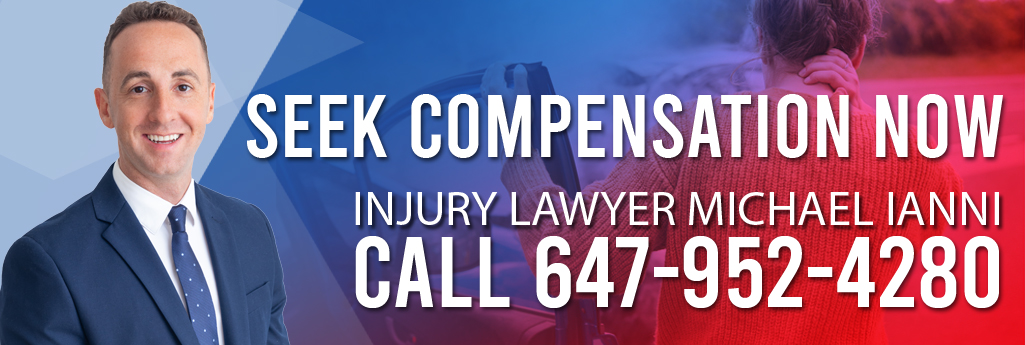

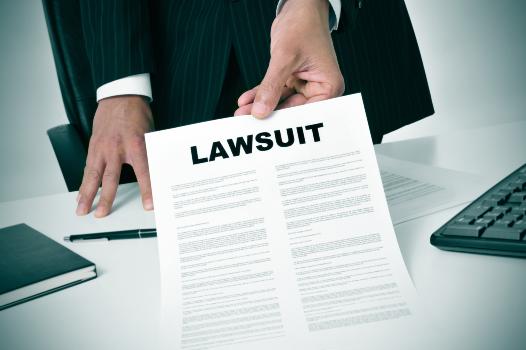
Car Accident Head Injury Symptoms in Ontario, Canada
What Are Common Head Injuries After a Car Accident in Ontario, Canada
Car accidents are an unfortunate reality, and they can result in a wide range of injuries. The head is one of the body’s most vulnerable parts during a car accident. In Ontario, head injuries from car accidents are common and can range from mild to severe.
We will explore the various types of head injuries that can occur after a car accident in Ontario and their potential long-term effects.
- Concussion
- Traumatic Brain Injury (TBI)
- Skull Fractures
- Cerebral Contusions (bruising of the brain tissue)
- Hematoma (blood clots)
- Diffuse Axonal Injury (DAI)
- Penetrating Head Injury
- Post-Traumatic Stress Disorder
- Whiplash
- Facial Injuries
Concussion
A concussion is one of the most common head injuries after a car accident. A concussion is a type of traumatic brain injury (TBI) that can cause headaches, dizziness, confusion, and memory problems. Sometimes, a concussion may not present any immediate symptoms but can appear later. Most concussions resolve within days to weeks but require proper rest and monitoring.
Traumatic Brain Injury (TBI)
Traumatic brain injury (TBI) is a term used to describe a range of brain injuries caused by a blow or jolt to the head. It ranges from mild to severe and can result in cognitive, physical, emotional, and behavioural impairments. Symptoms of a TBI may include headache, dizziness, confusion, difficulty concentrating, and memory problems. TBI can lead to long-term disability or death, depending on the severity and location of the injury.
Skull Fractures
Another type of head injury that can occur after a car accident is a skull fracture. A skull fracture occurs when there is a break in one or more of the bones that make up the skull. These fractures can be linear, depressed, diastatic, or basilar, depending on the severity and location. Symptoms of a skull fracture may include pain, swelling, bruising, or bleeding from the head. In severe cases, skull fractures can cause damage to the brain, infection, and cerebrospinal fluid leakage.
Cerebral Contusions
A contusion is a type of head injury involving brain tissue bruising. These are bruises of the brain tissue that result from direct impact on the head. Contusions can occur when the brain hits the inside of the skull during a car accident. Bruises can cause localized swelling, bleeding, and damage to brain cells, leading to temporary or permanent neurological deficits.
Hematoma
A hematoma is a type of head injury that occurs when blood pools outside the blood vessels in the brain. Hematomas can be life-threatening and require immediate medical attention. There are different types, such as epidural, subdural, and subarachnoid hematomas. Hematomas can cause increased pressure on the brain, leading to neurological deficits or even death.
Diffuse Axonal Injury (DAI)
Diffuse axonal injury (DAI) is a type of TBI that occurs when the brain moves inside the skull, causing tears in the brain’s nerve fibres due to a strong rotational force or acceleration. DAI is a severe injury that can cause long-term damage to the brain. This can cause widespread tearing of axons, leading to disrupted neural communication, swelling, and potentially permanent brain damage.
Penetrating Head Injury
A penetrating head injury occurs when an object, such as a shard of glass or metal, pierces the skull and enters the brain causing damage to brain tissue and blood vessels. Penetrating injuries can result in severe neurological deficits, infection, and death.
Post-Traumatic Stress Disorder (PTSD)
PTSD is a psychological condition that can develop after experiencing or witnessing a traumatic event, such as a car accident. Symptoms include flashbacks, nightmares, anxiety, and depression, and treatment typically involves therapy and medication.
Whiplash
Whiplash is a neck injury caused by a rapid back-and-forth neck movement, often resulting from rear-end car accidents. Symptoms include neck pain, stiffness, headaches, and dizziness. Most whiplash injuries resolve with rest, pain management, and physical therapy.
Facial Injuries
Facial injuries can range from minor cuts and bruises to severe fractures and disfigurements. They can involve soft tissues like skin and muscles or hard tissues like bones and teeth. Treatment depends on the extent and location of the injury and may include surgery, dental procedures, or other interventions.
Suppose you or someone you know has been involved in a car accident and experienced head injuries. In that case, it is crucial to seek medical attention immediately. These injuries can have long-term effects and require prompt treatment.
Additionally, contacting a lawyer specializing in personal injury cases is always recommended to ensure your rights are protected, and you receive fair compensation for any damages or injuries sustained. Remember, taking care of yourself and seeking professional help is the first step toward recovery.
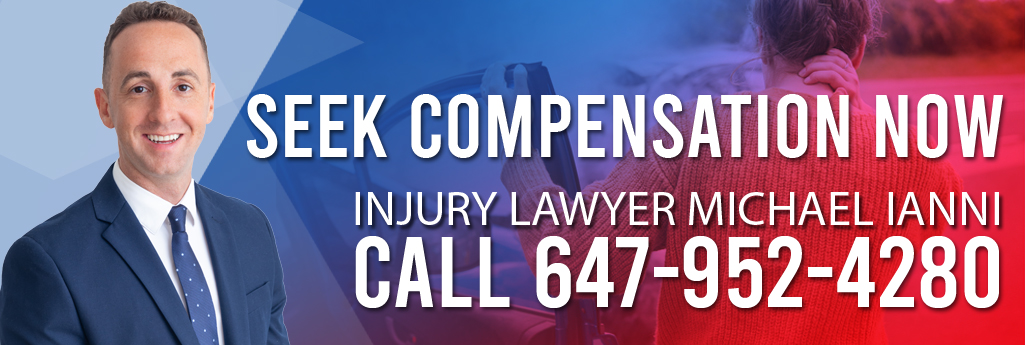


Car Crash Head Injury in Ontario, Canada
Common Symptoms of a Head Injury from a Car Accident in Ontario, Canada
Head injuries from car accidents in Ontario can have serious long-term consequences. Recognizing common symptoms is crucial for timely medical intervention. Prompt identification and treatment can significantly impact recovery and prognosis for individuals affected by head injuries.
Here are some of the most common symptoms of head injury which can occur from car accidents in Ontario:
- Headache: A common symptom following a head injury, ranging from mild to severe, often indicating increased pressure or trauma to the brain.
- Dizziness: A sensation of unsteadiness or lightheadedness that may affect balance and coordination, often resulting from inner ear or brain disturbances.
- Confusion: Difficulty thinking clearly, understanding, or processing information, which can indicate cognitive impairments due to brain injury.
- Nausea: The feeling of needing to vomit, often accompanied by discomfort in the stomach, can be a sign of a concussion or other brain injury.
- Vomiting: The act of expelling stomach contents through the mouth, sometimes due to increased intracranial pressure or brain injury.
- Fatigue: Persistent tiredness or exhaustion that can result from the body’s response to injury, affecting both physical and cognitive function.
- Blurred Vision: Impaired or distorted sight, which can result from injury to the brain, nerves, or muscles controlling eye movement.
- Ringing in the Ears (tinnitus): A persistent noise in the ears, such as ringing, buzzing, or humming, often resulting from damage to the auditory system or brain.
- Sensitivity to light and noise: Increased discomfort or pain in response to bright lights or loud noises, a common symptom of concussions and other head injuries.
- Memory problems: Difficulty remembering new information or recalling past events, indicating potential damage to brain areas responsible for memory.
- Difficulty concentrating: Trouble focusing on tasks, maintaining attention, or organizing thoughts, which can signal cognitive impairments from a head injury.
- Sleep disturbances: Changes in sleep patterns, such as insomnia, excessive sleepiness, or nightmares, often resulting from the effects of a head injury on the brain’s sleep-wake cycle.
- Mood changes: Unpredictable or uncharacteristic emotional shifts, such as irritability, sadness, or anxiety, can occur after a brain injury.
- Irritability: Increased frustration, anger, or impatience, often resulting from the emotional and cognitive effects of a head injury.
- Depression: Persistent feelings of sadness, hopelessness, or loss of interest in activities, sometimes occurring as a reaction to the life changes caused by a head injury.
- Anxiety: Persistent worry, fear, or unease, which can be a common response to the stress and uncertainty following a traumatic event like a car accident.
- Seizures: Sudden, uncontrolled electrical disturbances in the brain, causing changes in behaviour, movement, or consciousness, potentially indicating brain injury or damage.
- Loss of consciousness: A temporary or prolonged period of unconsciousness, often occurring immediately following a head injury and indicating severe brain trauma.
- Slurred speech: Difficulty forming words or speaking clearly, which can result from injury to the brain areas responsible for speech and language.
- Weakness or numbness in extremities: Reduced strength, sensation, or control in the arms or legs, indicating potential damage to the brain or nerves that control muscle function.
If you experience any of these symptoms after a car accident, seek immediate medical attention for diagnosis and treatment. Contact an experienced personal injury lawyer to help navigate insurance claims, medical expenses, and compensation, ensuring your rights and interests are protected.
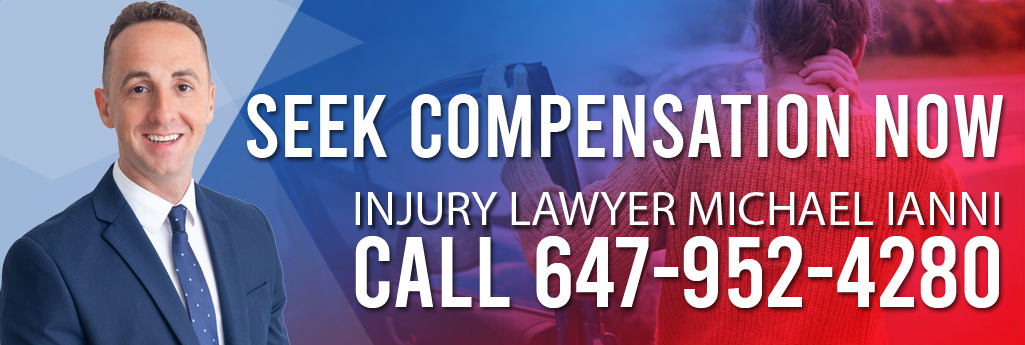
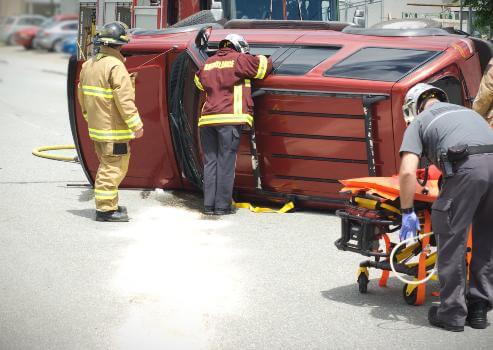

Head Injury Car Accident Symptoms in Ontario, Canada
What Is the Average Payout for a Head Injury in Ontario, Canada
In Ontario, the amount of compensation you can receive for a head injury in a car accident depends on various factors, including the severity of the injury, the extent of medical treatment and rehabilitation required, loss of income, and the impact on your quality of life.
There is no fixed amount or standard formula for calculating compensation, as each case is unique. However, payment for a head injury can range from thousands to millions of dollars.
Mild Head Injury / Concussion
Compensation for a mild head injury or concussion might range from $20,000 to $100,000. In these cases, the victim typically recovers within a few months to a year, with minimal long-term impact on their life.
Moderate Head Injury
The victim may have persistent symptoms like headaches, dizziness, or cognitive impairment for a moderate head injury. Settlements for these cases might range from $100,000 to $300,000.
Severe Head Injury
The victim may have permanent cognitive, physical, or emotional impairments in severe head injuries. These cases often result in higher compensation, ranging from $300,000 to over $1,000,000.
However, it’s important to note that these figures are only estimates and that the actual compensation amount will depend on each case’s circumstances. For example, compensation for brain injuries resulting in physical disabilities or ongoing complications may be significantly higher than the average settlement amounts.
Compensation in Ontario may include the following:
- Accident Benefits: These benefits are part of your mandatory auto insurance policy and cover medical and rehabilitation expenses, income replacement, and attendant care benefits, among others.
- Tort Claim: This claim is made against the at-fault driver’s insurance and may include compensation for pain and suffering, loss of income, future earning capacity, and other related expenses.
Suing for car accident trauma compensation in Ontario can be complex and lengthy. However, by following these steps and working with a personal injury lawyer, you can boost your chances of receiving the compensation you deserve. Remember to seek medical attention, gather evidence, contact a personal injury lawyer, file a lawsuit, attend mediation, go to trial, and collect your compensation.
*The laws pertaining to automotive injuries are complex and are contsantly evolving. The information on this website was not written by legal professionals and should not be considered legal advise. Please contact a professional personal injury lawyer serving Ontario for the most up to date and accurate information.






